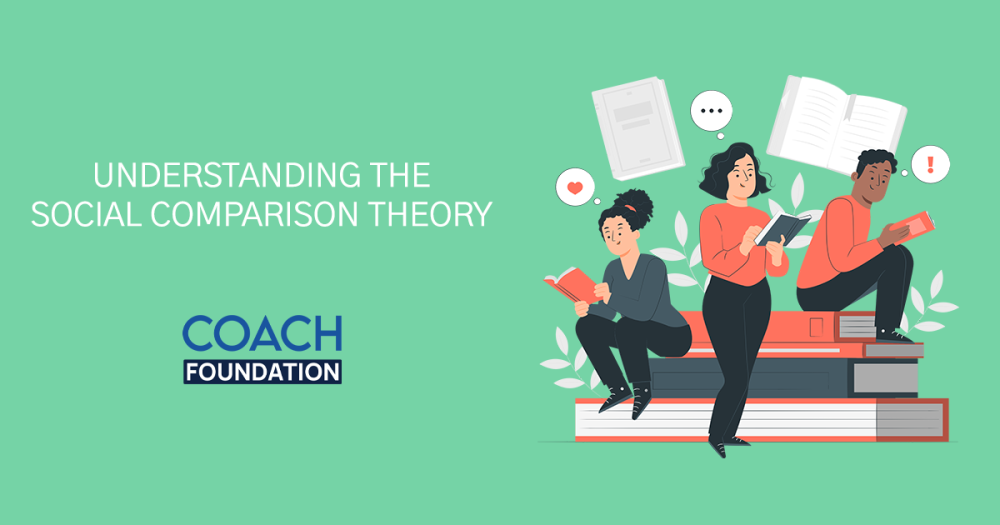Blog » Coaching Models and Techniques » Understanding the Social Comparison Theory
Understanding the Social Comparison Theory
Social comparison theory explains how and why we judge ourselves, our abilities, and our actions against others. Engaging in social comparisons allows humans to develop a robust sense of identity as well as establish relationships. This theory has been used to explain various phenomena, from self-esteem regulation to the spread of social media culture.

In this blog post, we will discuss the deeper implications for our mental well-being arising from comparing ourselves to others, and investigate the reality behind understanding the social comparison theory.
We will dive deeper into:
1. What is the Social Comparison Theory
2. How social comparison theory works
3. Models of social comparison
4. Application of social comparison theory to life coaching
Let’s get started!
What is the Social Comparison Theory
Social comparison theory proposes that individuals evaluate their own abilities and opinions by comparing themselves to others, often those with similar attributes. It suggests that people strive to maintain a positive self-concept through these comparisons.
The social comparison theory was first introduced by psychologist Leon Festinger in 1954. According to this theory, individuals determine their own social and personal worth based on how they stack up against others in a given situation.
This process of comparison can be either upward, where individuals compare themselves to those they perceive as superior, or downward. Individuals compare themselves to those they perceive as inferior.
The theory suggests that social comparison is a natural and inevitable human behavior. It can have both positive and negative effects on self-esteem and motivation. Understanding the social comparison theory can provide valuable insight into our own thought processes and help us navigate social situations with greater awareness and confidence.
How social comparison theory works
Social comparison theory suggests that individuals evaluate their own abilities, opinions, and emotions by comparing themselves to others, particularly those whose attributes are similar. This process can occur both consciously and unconsciously, and it serves as a way for people to gain information about themselves and their place in the social world.
There are two main types of social comparison: upward comparison and downward comparison.
The upward comparison involves comparing oneself to those who are perceived as better off, while the downward comparison involves comparing oneself to those who are perceived as worse off. These comparisons can have different effects on an individual’s self-concept and emotions, depending on the specific situation and the individual’s goals and values.
Overall, social comparison theory suggests that people strive to maintain a positive self-concept through these comparisons and that social comparison can have both positive and negative consequences for an individual’s well-being and behavior. It is a widely studied theory in social psychology and has applications in fields such as marketing, education, and mental health.
However, social comparison can also have negative effects, such as decreased self-esteem or envy towards those who possess the qualities we desire. Understanding the social comparison theory can help us navigate the often-complex world of social interactions and improve our overall well-being.
Models of social comparison
Social comparison is a process that we all engage in to evaluate our own abilities, beliefs, and attitudes toward those of others. Several models of social comparison have been developed to explain how this process works.
Understanding these different models of social comparison can help us better understand how people perceive others. It can provide us with strategies for mitigating the negative effects of social comparisons, such as envy and low self-esteem.
Let’s understand the models of social comparison one by one!
Self-evaluation maintenance model
The self-evaluation maintenance model is a theory that highlights how individuals react to the success or failure of others within their social circle. According to this theory, people tend to compare themselves with others and evaluate their performance based on this social comparison.
When someone close to us succeeds in an area where we also excel, our self-esteem may be threatened, leading to negative emotions. However, a different reaction may occur when someone outside of our social circle succeeds in something we do poorly; we may feel neutral.
Understanding this theory can provide insights into how individuals evaluate themselves and their relationships with others. A self-evaluation maintenance model is a valuable tool for researchers and professionals looking to understand human behavior and development.
Proxy model
The proxy model of social comparison theory suggests that individuals may use others as proxies to evaluate themselves when direct comparisons are not possible or desirable. This can occur when individuals lack information about themselves. When they are unsure of how to evaluate themselves or when they want to avoid the negative consequences of direct comparison.
In the proxy model, individuals compare themselves to a reference group, such as the average or ideal person in their social environment, rather than to specific individuals.
This allows for a more general evaluation of oneself and can provide a sense of belonging and validation. The proxy model has implications for understanding social influence, self-esteem, and decision-making in various contexts.
Triadic model
The triadic model is a theoretical framework that has been widely used in the field of communication studies to understand the dynamics of interpersonal communication. This model emphasizes the significance of a third party, called the mediator, in communication between two individuals, referred to as the sender and receiver.
The mediator’s role is to regulate the flow of communication between the sender and receiver. This ensures that messages are conveyed accurately, and helps resolve conflicts that may arise during the communication process.
The triadic model is particularly useful in understanding the complexities of communication in various contexts, such as personal relationships, workplace communication, and even public speaking. Understanding this model can help individuals improve their communication skills and build better relationships, making it a valuable tool in the field of communication.
Three-selves model
In psychology, the concept of “self” is complex and multifaceted. The three-selves model is a theoretical framework created by psychologists Richard M. Ryan and Edward L. Deci.
It suggests that an individual has three interdependent selves: the autonomous self, the social self, and the conceptual self. The autonomous self refers to the individual’s desire for independence, the social self pertains to the importance of social connections, and the conceptual self deals with one’s core beliefs and values.
The three-selves model emphasizes the interplay between different aspects of an individual’s self-concept and how they relate to motivation and well-being. By understanding the complex nature of the self, individuals can gain insight into what drives their behavior and make changes accordingly.
Applying social comparison theory to life coaching
Social comparison theory has been used in various fields, including psychology and marketing. In recent years, it has also been applied to life coaching. This theory suggests that people evaluate themselves based on comparisons with others who are relevant to them.
In the context of life coaching, this means that clients often compare their progress to that of other individuals around them. By understanding how social comparison influences individual behavior, a life coach can create a more effective coaching plan that promotes self-motivation and confidence.
By identifying the goals of their clients and incorporating social comparison theory into their coaching techniques, coaches can empower individuals to make better life decisions for themselves. Ultimately, the application of social comparison theory to life coaching can lead to more successful and fulfilling lives for many individuals.
Conclusion
Social comparison theory is a fundamental concept in social psychology that helps us understand how individuals evaluate themselves by comparing themselves to others. It suggests that people have an innate drive to maintain a positive self-concept, and they use social comparison as a tool to achieve this goal.
The theory also acknowledges that comparisons can have both positive and negative effects on an individual’s emotions and behaviors. By understanding the different types of social comparisons, such as upward and downward comparisons, and the proxy model, we can better understand how social influence and self-esteem are formed and maintained.
What are your thoughts about this blog post? Do you believe that there are other viewpoints or valuable ideas that have not been considered? You are welcome to share your opinions in the comments section.
Frequently Asked Questions (FAQs)
What is the concept of social comparison theory?
Social comparison theory is a concept that explains the human tendency to evaluate ourselves by comparing ourselves to others. It suggests that people evaluate their own opinions, abilities, and overall worth by comparing them to those of others.
This comparison can be either upward, where we compare ourselves to those who are better off than us, or downward, where we compare ourselves to those who are worse off than us. This theory can be seen in various aspects of everyday life, from the way we judge our looks to the way we perceive our achievements.
Examples of social comparison theory
Some classical examples of social comparison theory include comparing our performance to that of our peers in class, comparing our salary to that of our colleagues, or comparing our social media activity to that of our friends.
These comparisons can have both positive and negative effects on our self-esteem, depending on whether we perceive ourselves as inferior or superior to others. Understanding social comparison theory can help us develop a healthier and more realistic self-perception, and improve our interaction with others.
Who founded social comparison theory?
Social comparison theory was founded by psychologist Leon Festinger, who first proposed it in the late 1950s. Festinger posited that individuals are driven to compare themselves to others to gain a better understanding of themselves and their place in society. His groundbreaking work laid the foundation for much of the research on social comparison that has followed in the intervening decades.

ABOUT SAI BLACKBYRN
I’m Sai Blackbyrn, better known as “The Coach’s Mentor.” I help Coaches like you establish their business online. My system is simple: close more clients at higher fees. You can take advantage of technology, and use it as a catalyst to grow your coaching business in a matter of weeks; not months, not years. It’s easier than you think.
AS SEEN ON





